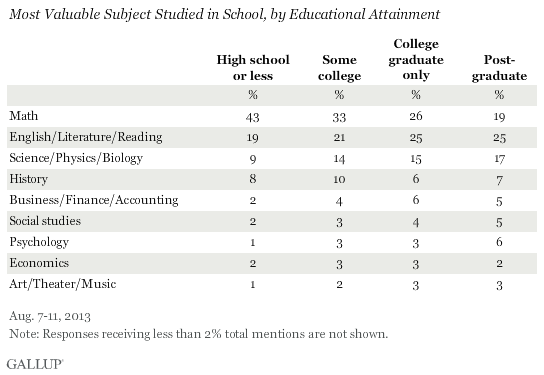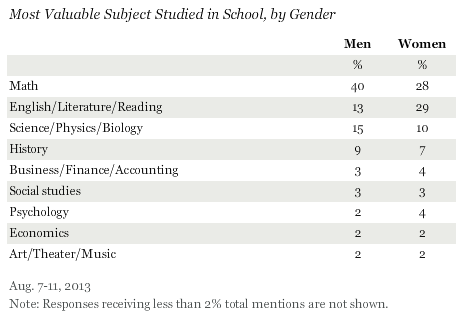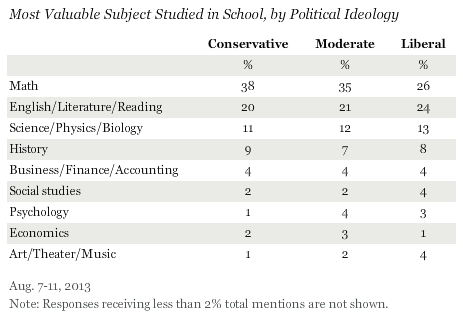PRINCETON, NJ -- Math is the clear winner when Americans are asked to say which school subject has been most valuable to them in their lives, followed by language arts -- English, literature, or reading -- and science. Math and English were also the top two subjects when Gallup first asked this question in 2002.
![Trend: Thinking about all the subjects you studied in school, which one, if any, has been the most valuable to you in your life? [OPEN-ENDED]](http://content.gallup.com/origin/gallupinc/GallupSpaces/Production/Cms/POLL/svp9rjg4yusib540ab1izq.png)
The results, from Gallup's Aug. 7-11 Work and Education poll, are generally similar to those from 11 years ago. The most notable difference is a sharp increase in the percentage mentioning science, from 4% to 12%. While still well behind math and English, science has now moved ahead of history into third place in the rank order of subjects.
The question does not specify which level of school -- grade school, high school, college, or postgraduate study -- respondents should use in assessing the value of subjects. Thus, respondents were free to look back over their entire educational history to select the subject they thought was most valuable to them.
However, responses do differ according to Americans' own level of educational attainment, with math increasingly less likely to be mentioned by those with higher levels of education. Specifically, 43% of those with a high school education or less say math has been most valuable, compared with 19% among those with postgraduate education.
In contrast, the importance of English rises with higher levels of formal education, tying math as the most important among four-year college graduates and coming in first among postgraduates. It could be that those with higher education levels are more likely to use written communication as a part of their jobs.

English also ranked ahead of math as postgraduates' choice for most valuable subject in 2002.
Postgraduates are about as likely to mention science as math as the most valuable subject for them.
Women Divided in Views of Most Valuable Subject
Men overwhelmingly say math has been the most valuable subject in their lives, with English and science essentially tied for second. Women are as likely to mention English as math as the most valuable subject.

Math is also the top subject across household income levels and among Republicans, Democrats, and independents. And while math is No. 1 among political conservatives and moderates, math and English are essentially tied among liberals.

Implications
Proponents of focusing on the "three R's" in school -- reading, writing, and arithmetic -- would be happy to know that U.S. adults report math and English are the school subjects that have been most valuable in their lives. While there is public support for teaching students skills such as critical thinking and communication in addition to core subject material, the poll results show the importance of teaching math and English in schools.
Those who want to see an increased emphasis on STEM (science, technology, engineering, and math) training for today's students will also be encouraged to note that math and science are two of the top three subjects Americans mention, but cautioned by the high ranking of English.
Americans may have a bit of a love-hate relationship with English and math, particularly math. When Gallup asked Americans in 1989 to name their favorite school subjects, math led, with 26%, followed by history (18%) and English (13%). But in the same poll, math tied English as Americans' least favorite subject.
Survey Methods
Results for this Gallup poll are based on telephone interviews conducted Aug. 7-11, 2013, with a random sample of 2,059 adults, aged 18 and older, living in all 50 U.S. states and the District of Columbia.
For results based on the total sample of national adults, one can say with 95% confidence that the margin of sampling error is ±3 percentage points.
Interviews are conducted with respondents on landline telephones and cellular phones, with interviews conducted in Spanish for respondents who are primarily Spanish-speaking. Each sample of national adults includes a minimum quota of 50% cellphone respondents and 50% landline respondents, with additional minimum quotas by region. Landline and cell telephone numbers are selected using random-digit-dial methods. Landline respondents are chosen at random within each household on the basis of which member had the most recent birthday.
Samples are weighted to correct for unequal selection probability, nonresponse, and double coverage of landline and cell users in the two sampling frames. They are also weighted to match the national demographics of gender, age, race, Hispanic ethnicity, education, region, population density, and phone status (cellphone only/landline only/both, and cellphone mostly). Demographic weighting targets are based on the March 2012 Current Population Survey figures for the aged 18 and older U.S. population. Phone status targets are based on the July-December 2011 National Health Interview Survey. Population density targets are based on the 2010 census. All reported margins of sampling error include the computed design effects for weighting.
In addition to sampling error, question wording and practical difficulties in conducting surveys can introduce error or bias into the findings of public opinion polls.
View methodology, full question results, and trend data.
For more details on Gallup's polling methodology, visit www.gallup.com.
